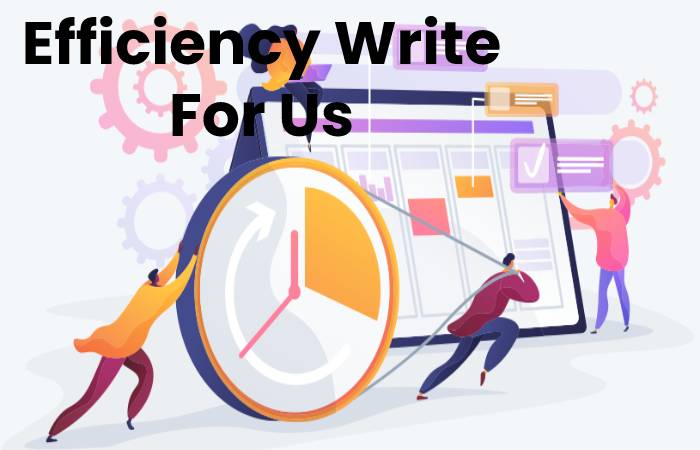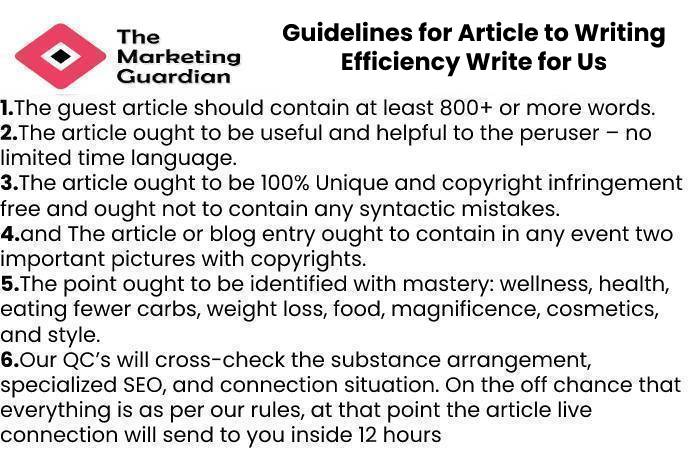Efficiency Write For Us
 Efficiency is the ability to achieve a wanted result or achieve a desired result. When something is compelling, it has the desired or expected result or makes a deep and powerful impression.
Efficiency is the ability to achieve a wanted result or achieve a desired result. When something is compelling, it has the desired or expected result or makes a deep and powerful impression.
Efficiency is derived from the term Latinofficia and refers to relying on something or someone to achieve a result. This concept is also often equated with power or action.
For example: “Prove your efficiency by doing this work, and you will stay in the company,” “The efficiency of this engine cannot be questioned. Without efficiency, this office does not make sense.
Thus, efficiency associated with the rational use of the means available to achieve the objective. It can achieve the previously set goal in the shortest time and with the least amount of resources, which means optimization.
Efficiency in physics and economics
You can get an idea of the effectiveness in different areas. In physics, for example, efficiency is related to the relationship between energy input and the energy used in a procedure or a system.
In economics, we speak of Pareto efficiency or Pareto optimality (Vilfredo Pareto) to name the state reached when it is impossible to improve the position of a component of the system without attacking the state others.
Pareto optimal, for example
An example of Pareto efficiency would : a person walks into a store to buy a computer. Each of them has different characteristics and its price, which is usually associated with quality. Thus, when a buyer decides to finalize his purchase, he has two options:
On the one hand, a person has enough money to buy the best computer regardless of the price. There is only one goal here: the purchase of equipment with the best technical characteristics.
However, the buyer may have a limited budget. There then arises a problem with multiple objectives, since a person must consider the technical characteristics of the computer and its price. In this case, there is no one optimal product, but there are several optimal Pareto options to choose from.
This term refers to the resources that a person has (human, technological, financial, physical, etc.) available to achieve something. The way they are used and the results achieved, the better these resources were used, the better it was. ‘efficiency in achieving this goal.
How efficiency is applied
The effectiveness can determined one way or another depending on the article used. For example, if applied to administration, it refers to the use of resources that are available means of production, and the level of efficiency achieved can known using the equation E = P / R (P = products manufactured; R = resources used).
Some experts, such as Koontz and Weirich, argue that efficiency is about achieving goals a business sets for itself with as few resources as possible. On the other hand, Robbins and Coulter argue that he obtains significant results by investing as little as possible. At the same time, Reinaldo O. Da Silva inclined to say that efficiency involves working in a certain way in which all resources are used most appropriately.
As for the economy, its efficiency implies making the best use of society’s resources, meeting the wants and needs of people with results. In this area, expert Simon Andrade defines it as a way to measure the performance of a particular system in which the use of existing resources is minimized.
Efficiency differences
It is common to confuse the meaning of the term “efficiency” with the importance of “efficiency,” although they are very different.
While effectiveness implies a positive relationship between project resources and the results achieved, effectiveness refers to the level of objectives achieved in a given period, i.e., reaching what the group intends to do. Effectiveness is simply the achievement of a set goal, regardless of the level of resources involved.
This means that it possible to be effective, but not adequate, and vice versa, but if both requirements are met, we are faced with an ideal project: effective because it was implemented with a minimum of resources, and efficient because it has not been extended at the right time.
How to Submit Your Articles
For Submitting Your Articles, you can email us contact@themarketingguardian.com
Why Write For The Marketing Guardian- Efficiency Write for Us
 Search Terms Related to Efficiency Write For Us
Search Terms Related to Efficiency Write For Us
mathematics
algorithmically computable
effective theory
heat exchanger
NTU method
human–computer interaction
efficiency
pragmatic clinical trials
Combat effectiveness
military science
Middle English
Peter Drucker
Search Terms for Efficiency Write For Us
write for us
looking for guest posts
guest posting guidelines
become a guest blogge
guest post
becomes an author
suggest a post
contributor guidelines
guest posts wanted
submit an article
writers wanted
guest posts wanted
submit the post
contributing writer
Guidelines for Article to Writing Efficiency Write for Us
 For Submitting Your Articles, you can email us contact@themarketingguardian.com
For Submitting Your Articles, you can email us contact@themarketingguardian.com
Related Pages
Digital marketing Write For Us
Chief marketing officer write for us
Content Marketing Write For Us
Electronic Commerce Write For Us
Virtual Restaurant Write For us
Affiliate marketing Write For Us
Corporate Finance Write For Us
Online Sales Strategy Write For Us

